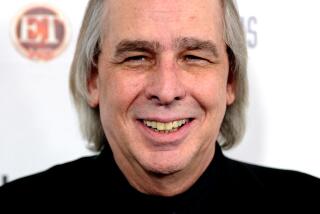Tuning In to Catchy Slogans : Radio: ‘Classic rock’ and ‘more music’ may seem like lightweight claims, but the research and development that go into such sayings is big business.
- Share via
Choosing from among the more than 80 radio stations in Southern California can be a confusing, even mind-boggling experience.
If you’re a nostalgic sort, do you tune in to the station “with more of your favorite oldies” (KRTH-FM)? Or to the one with “all oldies all the time” (KRLA-AM)? What about “non-stop oldies” (KODJ-FM)?
There’s also the option of the “only station for classic rock” (KLSX-FM). And another with “more music, more memories” (KLIT-FM).
If it’s information you’re seeking, you might prefer the station with “more traffic, more often” (KNX-AM). But then what about the one that boasts of featuring “twice the traffic” (KFI-AM)?
Maybe if you’re stuck in twice the traffic, you’ll actually find the time to sample all these stations. If you do, you’ll find many slogans that are at best silly and nondescriptive, and, at worst, patently untrue.
Take the claim being made by KXEZ-FM (formerly KJOI) that it is the “the only station for easy music.” What about KBIG-FM, KOST-FM, KSRF-FM and KLIT-FM, which also play soft hits or “easy music?”
Though slogans--called “position statements” by the radio industry--may seem like lightweight stuff, their research, development and selection is indeed big business.
“They have these things tested and they spend lots of money on research,” said J. Rae Padden, president of the local chapter of the Radio Advertising Bureau. “Somebody just doesn’t walk in one morning and say, ‘Let’s say ‘The Big Mix.’ . . . Every station slogan--whether you think it’s good, bad or indifferent--has been costed out and researched.”
The best slogans are catchy and pithy, according to broadcast consultant John Lund.
“A slogan should be, in a nutshell, what’s good in a radio station and gets you to listen,” Lund said. It should also be, he noted, “unique, credible and beneficial.”
But credibility appears to be the least valued of the criteria. Truth in radio sloganeering is not strictly enforced.
For example, KLSX contends that it is “the one station that everyone at work can agree on.” KOST makes the same statement in one of its slogans. Are there, instead, two stations that everyone at work can agree on? Have employees even been polled on this matter?
Jumping on the bandwagon when a slogan appears successful is a favorite pastime for radio stations.
“If (the slogan) ‘power pig’ becomes a sensation in Tampa, then all of a sudden you’ve got stations all over the country calling themselves ‘the power pig,’ ” said Ken Barnes, managing editor of Radio and Records, an industry publication. “To use another animal metaphor, it’s very lemming-like.”
Station officials generally defend the practice of sloganeering, citing the advertising potential of the phrases.
“If you’re accentuating your positive and you say it enough times, it eventually will pay off,” said KODJ promotion director Nicole Sandler. “Where it doesn’t pay off is if it’s not describing anything or if it’s not true, then you’re working against yourself.”
“They help you describe either how you perceive yourself to be or what they tell you you are, or what you hope you are,” said Bob Griffiths, KXEZ-FM (98.7) general manager.
Sometimes they seem to beat listeners over the head with a simple concept.
It doesn’t take a rocket scientist to extrapolate that if KLSX is “the only station for classic rock,” then it also plays “the most classic rock.” And given those assertions, then there’s no question that “at work, at home or in a car, when you hear classic rock, it’s 97.1 KLSX.”
What exactly constitutes “classic rock” anyway? How does “classic rock” differ from those other classics that some call “oldies”?
“In my definition, there’s classic hits and there’s classic rock,” said Steve Ellis, KLSX program director. “You can hear classic hits on KODJ, KRLA, KRTH. We’re classic rock . We’re the Doors, the Who, Led Zeppelin and the Stones, and there’s not another station doing that.”
But all those groups can be heard on the “the home of rock ‘n’ roll,” KLOS-FM (95.5), just to the left of KLSX on the dial, as well as on at least half a dozen other stations.
Although slogans are considered serious business by most station officials, some radio stations like to poke fun at the entire notion. KROQ-FM (106.7) boasts of being “the only Southern California station that doesn’t call Wednesday ‘hump day.’ ” “Pirate radio” KQLZ-FM (100.3) tells listeners, “Our ratings are so low it doesn’t matter what we do.”
A key function of a slogan, said Radio and Records’ Barnes, is to inspire listeners to remember the station--especially if they are selected to be surveyed by a ratings service.
“The idea is for that slogan to come out when they fill out that Arbitron diary or get a call from Birch (survey service),” Barnes said. “If you sledgehammer them enough with it, it will come to mind. You’re not necessarily looking to make a profound, conscious impression. You’re just trying to sink a hook into a listener’s sub-conscious.”
Oddly enough, a slogan lacking in cleverness and originality may actually be to a station’s advantage, posited consultant Lund.
“If it requires you to think about it, you’re down the tubes because the masses are bombarded with tens of thousands of advertising messages each day,” Lund said. “And thinking is not something that the American public should be required to do when making a brand decision.”


